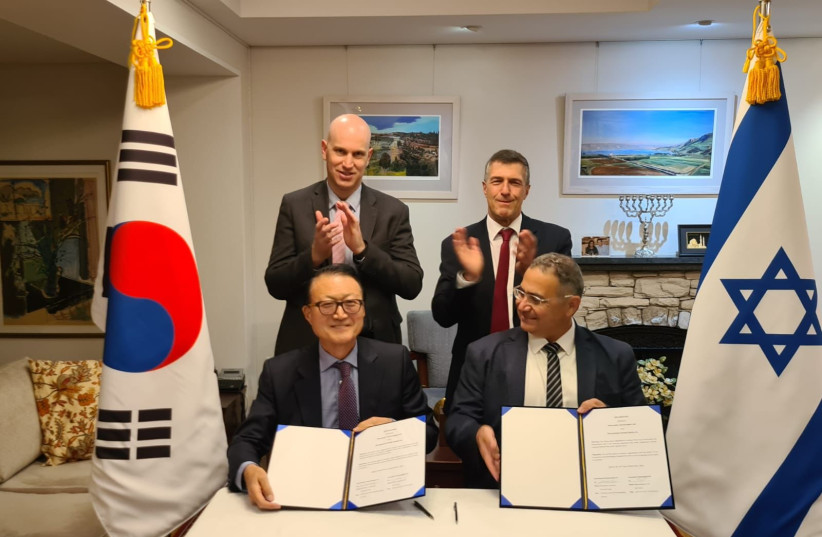South Korea is the latest country touched by the start-up nation’s global footprint – and from the perspective of igniting innovation, it is a match made in heaven.
This month, a landmark free trade agreement (FTA) between Israel and South Korea took effect, eliminating customs duties on agricultural and industrial imports. It represents the first FTA that Israel has signed with an Asian country and cements the country’s growing ties with the world’s 11th-largest economy. On an annual basis, Israel exports approximately $1.5 billion to South Korea, while importing $2 billion in Korean goods.
But what exactly makes Israel and South Korea natural trade partners?
Aside from their status as technologically advanced democracies, the countries bring highly complementary assets and experiences to the table in their collaboration. Israel provides the entrepreneurial mindset that drives innovation. South Korea brings its expertise in the realm of scaling, alongside its uncompromising yet cost-effective industrial quality. It is no surprise, then, that Israeli-South Korean joint enterprises are poised to flourish.
In addition to the FTA, another groundbreaking partnership now promises to take the commercial ties between Israel and South Korea to the next level. Recently, Israeli climate-tech company Airovation Technologies announced a Memorandum of Understanding with South Korea-based Kolon Industries Inc. to collaborate on a three-phase scale-up process for CO2 capturing (carbon capture) at Kolon’s manufacturing facility.
The Israeli government and in particular, Israel’s Ambassador to the Republic of Korea Akiva Tor and Israel’s former economic attaché in Korea Yaniv Goldberg, played an influential role in facilitating this partnership.

Developed over a decade of research at The Hebrew University of Jerusalem, Airovation Technologies’ core innovation is the in-situ generation of Superoxide Radical, the most powerful oxidizer in nature. The company’s completion of a $16 million Series A funding round, predominantly for its patented air-purification solutions – led by Dreamstone Partners and including the Yozma Group Korea as well as the Unid Global Corporation. The funding spurred a breakthrough for the carbon capture, utilization and storage (CCUS) industry, with Airovation Technologies’ chemical invention able to transform carbon dioxide emissions into valuable minerals and products that can be used in the food, feed, glass and fertilizer industries.
Now, Airovation Technologies’ initial collaboration with Korean investors is bearing fruit for the Israel-South Korea relationship through the climate-tech company’s partnership with Kolon.
CCUS represents a highly impactful area for cooperation between Israel and South Korea, given the industry’s crucial and cutting-edge role in helping to meet global energy and climate goals, including those stipulated in the Paris Climate Accords. CCUS delivers 38% of the emissions reductions needed in the chemical sub-sector and 15% in cement, iron and steel, according to International Energy Agency (IEA).
It also provides a competitive decarbonization solution for various industrial processes; spurs greater investment in shared CO2 transport and storage infrastructure, reducing costs and thereby creating economies of scale; and supports public and private procurement for lower-carbon cement, steel, glass and chemicals, accelerating the adoption of lower-carbon processes that help establish sustainable markets worldwide.
Despite its status as a global innovator, the start-up nation is behind on CCUS innovation because to date, no government policy has pressured polluting factories into supporting change through entrepreneurship. But today, in light of new multinational partnerships that are being formed, such as that between Airovation Technologies and Kolon, tangible progress is closer than ever.
As a testament to Airovation Technologies’ status as a CCUS leader, the company was selected to represent Israel in a delegation of the Import Institute at the renowned 2022 UN Climate Change Conference (COP27), where it showcased its innovative carbon capture technology. Further, last month, Airovation Technologies signed an MOU with Phoenicia, the sole glass manufacturer in Israel, to transform the country’s glass production process into a carbon-friendly operation.
Following this month’s transformative free trade agreement with one of the leading economies in the world, Airovation Technologies’ MOU with Kolon is precisely the kind of partnership that will propel the broader Israel-South Korea relationship to new heights – a match made in heaven between start-up nation’s ingenuity and an ideal partner for the purpose of scaling technological innovation.
The writer is the co-founder and COO of Airovation Technologies.
